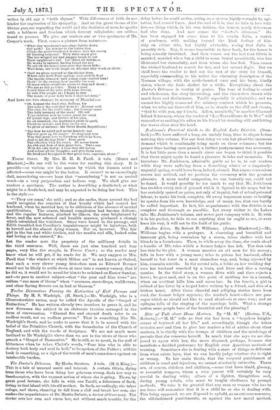The Doctor's Dilemma. By Hesba Stretton. 3 vols. (H. S.
King.)— This is a tale of unusual merit and interest. A certain Olivia:flying from those- who have been doing her grievous wrong, finds her way to Southampton, with the vaguest notion of where she is going. There, by -great good fortune, she falls in with one Tardif, a fisherman of Sark, living in that island with his old mother. In Sark, accordingly-, she takes refuge, and there, chancing to fall from a cliff and break her arm, she makes the acquaintance of Dr Martin Dobree, a doctor of Guernsey. The -doctor sets her arm and cures her, not without much trouble, for the delay before he could arrive, acting on a system highly wrought by agi- tation, had caused fexer. And the end of it is, that he falls in love with her,—a thing which, in his own fashion, the honest, manly fisherman had also done. And now comes the "doctor's dilemma." He has been engaged for some time to his cousin Julia, a match of prudence, with nothing beyond the kind feeling of kin- ship on either side, but highly advisable, seeing that Julia is passably rich. Nay, it seems impossible to draw back, for the house is being actually furnished. And then comes out the fact that Olivia is married, married when but a child to some brutal spendthrift, who has ill-treated her shamefully, and from whom she has fled. Then comes the wicked husband to search for her, and her second flight. But we shall leave the reader to find out the rest of the story for himself, especially commending to his notice the charming description of the Norman village, with the noble-hearted cure and his busy, kindly sister, where she finds shelter for a while. Everything about the Doctor's Dilemma is worthy of praise. The tone of feeling is sound and wholesome, the story interesting, and the characters drawn with much force and distinctness. Tarclif especially is admirable ; and we cannot too highly commend the salutary contrast which he presents, when we take our farewell of him, as he stands on tho cliff and shouts, "God be with you, my hie/n.18. Adieu, manfselle," to another Channel Island fisherman, whom the reader of "Los Travailleurs de la Mor " will remember as making his adieu to his friend by standing still and letting the waves close over his head.


































 Previous page
Previous page